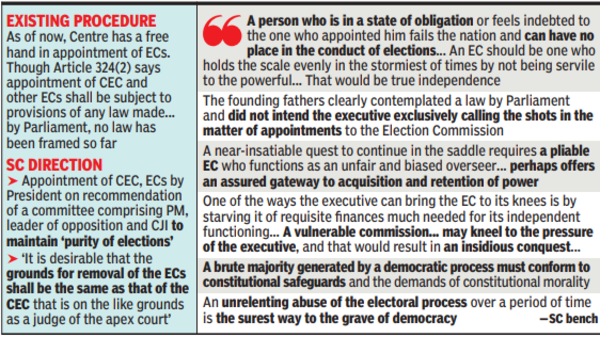- Home
- Prelims
- Mains
- Current Affairs
- Study Materials
- Test Series
 EDITORIALS & ARTICLES
EDITORIALS & ARTICLES
How are the CEC and ECs appointed, and what has the Supreme Court order changed?
- A Constitution Bench of the Supreme Court in its landmark judgment has held that the Chief Election Commissioner (CEC) and Election Commissioners will be appointed by the President on the advice of a committee that includes:
- The Prime Minister,
- The Leader of the Opposition (LoP) in the Lok Sabha, or the leader of the single largest party in Opposition, and
- The Chief Justice of India (CJI)
- This judgement of the Supreme Court has put an end to the practice of appointing the CEC and ECs on the advice of the Council of Ministers, as is laid down in the Constitution.
How are the CEC and ECs currently appointed?
- Under Article 324 (2), the President appoints the CEC and other Election Commissioners.
- The President makes the appointment on the advice of the Union Council of Ministers headed by the Prime Minister.
- The Constitution does not prescribe any qualifications, academic or otherwise, for appointment to these offices.
- The tenure of office and the conditions of service of all the commissioners is determined by the President.
- The tenure of commissioners is 6 years or up to the age of 65, whichever is earlier.
- The CEC and the two other ECs have the same powers and emoluments, including salaries, which are the same as a Supreme Court judge.
- All three commissioners have the same right of taking a decision. In case of a difference of opinion amongst the three members, the matter is decided by the Commission by a majority.
- The Constitution has not debarred the retiring Election Commissioners from any further appointment by the Government.
- Composition: The commission consists of a Chief Election Commissioner (CEC) and two Election Commissioners (ECs).
 Can CEC and ECs be removed?
Can CEC and ECs be removed?
- Article 324 of the Constitution of India mentions the provisions to safeguard and ensure the independent and impartial functioning of the Election Commission.
- The CEC is provided with security of tenure.
- He cannot be removed from his office except in the same manner and on the same grounds as a judge of the Supreme Court.
- Any other election commissioner or a regional commissioner cannot be removed from office except on the recommendation of the CEC.
What does the recent Supreme Court ruling say?
- The CEC and other ECs should be appointed by the President on the advice of a committee comprising the prime minister, the leader of the opposition in the Lok Sabha, and the Chief Justice of India.









 Latest News
Latest News General Studies
General Studies